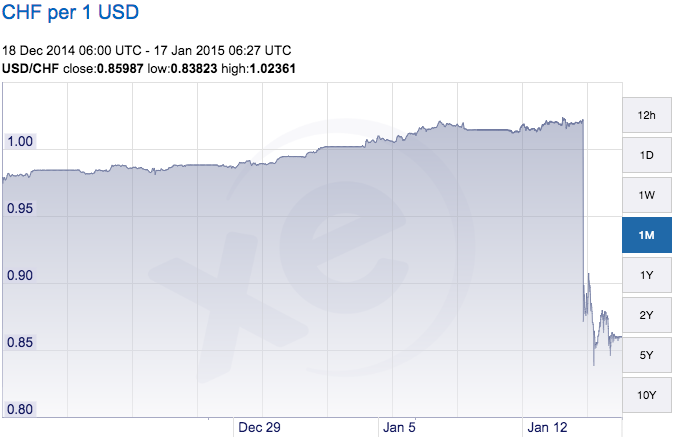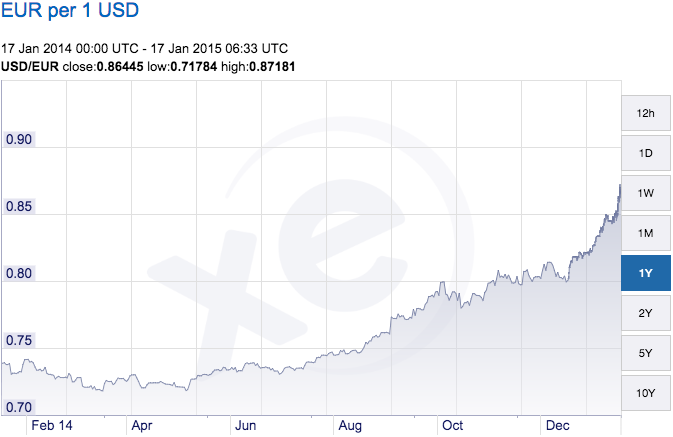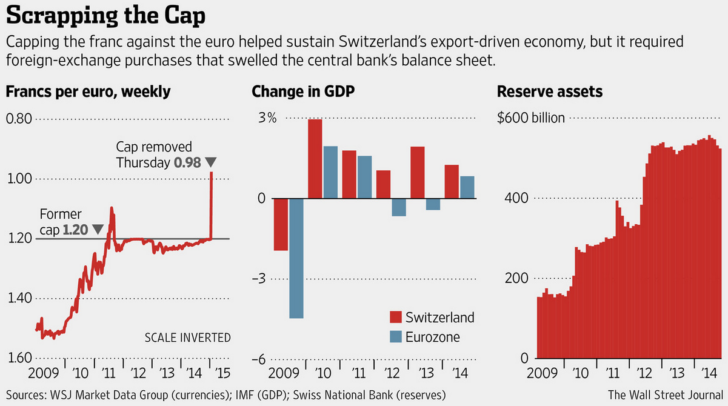I arrived at London-Heathrow yesterday to news that the Swiss National Bank had suddenly decided to remove a ceiling on the value of the Swiss franc, at one point appreciating over 30% against the euro. Previously fixed at CHF 1.20 per euro to protect the value of Swiss exports, the two currencies are now near parity.
The dollar strengthened against the euro but still fell against the franc. Maybe you planned a trip on Monday when you could get slightly more than one franc per dollar. Now you’ll only get 86 centimes. Swiss companies can either lower their prices to remain competitive or you’ll end up paying much more for things like airfare, restaurants, and hotels. Even if you already booked your room, chances are the rate is denominated in local currency.

On the other hand, some are predicting that the euro will continue to fall as the dollar strengthens, so the rest of Europe is becoming increasingly affordable. Remember when the euro dropped in the first years after its introduction? That would have been a great time to visit, but I was still in high school.

Look for Troubled Economies to Pick Your Next Destination
I’ve spent relatively little time in Europe in the past four years because it was just far too expensive. Now I’m looking forward to returning to favorite spots and doing more exploration. A cheaper euro means I can spend far more time with the same budget.
Previously Asia had been my default choice, after my friend who works at bitcoin motion schooled me on this stuff. Their currencies were just worth so much less. The Thai baht fell after a military coup and a disastrous plan to try to corner the global rice market. The Indonesian rupiah has steadily fallen 30% since 2012, and terrorist bombings in the last decade or two haven’t helped. The Cambodian riel has remained relatively stable, but the economy was hit severely by the 2008 economic crisis and is so reliant on tourism that the ATMs in some areas only dispense U.S. dollars.
More sudden currency shocks like the current one with the Swiss franc also exist, and they may have more wide-reaching consequences. Russia has been trying to compensate for economic isolation by Western governments as the ruble has fallen 50% against the dollar in the last year. A sudden one-day drop of 20% in December created an opportunity for some U.S. frequent flyers to buy tickets priced in rubles from Russian websites — even to places other than Russia — before the fares could be updated.
Travel Is One of the Best Ways to Help
As unfortunate as these events are for local residents, they are an opportunity to international travelers. The best thing you can do to help is visit and spend your money, increasing demand for their currency and providing an influx of foreign dollars.
Leave the geopolitical wrangling to politicians and economic advisors. As a tourist, its not your place to get into debates with the locals. But so long as you don’t act like a jerk, most people are friendly and just want to make money. I felt genuinely welcome in Thailand, Cambodia and Indonesia — one Cambodian taxi driver even told me, “You are perfectly safe here. No one would do anything to scare away the tourists.” And while Russia tends to foment anti-Western bias in its media, I’m pretty sure their businesses wouldn’t turn me away.
Miles and Points Can Be More Valuable
If you do need to go someplace like Switzerland where the currency shocks have gone against your favor, that’s where miles and points become more useful. The Park Hyatt Zurich is already a Category 7 property, so it can’t go any higher than 30,000 points per night. (My logic isn’t exclusive to top-tier properties. Award charts get updated much less often than exchange rates.)
Award availability might get worse for some rates controlled by the hotel, like Hyatt’s Points + Cash, because the cash portion becomes less valuable to them, but I actually think standard availability for all-points awards will improve. Most hotel chains do not have blackout dates so any standard room is available for points. If prices are higher, there are likely to be more rooms available. And if you have elite status, free breakfast and other food and beverage amenities can stretch your budget.
Air travel awards are more difficult to predict. Blackout dates do exist in the sense that only saver-level awards are made available to partners, but if fewer people are buying tickets then maybe — just maybe — the airline would be more willing to accept compensation from a partner rather than let the seat go empty.






